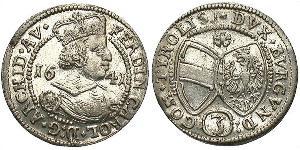20 Kreuzer (Vendida por $13.0)
1813, Austrian Empire, Emperor Francis I. Silver 20 Kreuzer Coin. (VF+) Kremnitz!
Mint Year: 1813 Reference: KM-2142. Mint Place: Kremnitz (B) Denomination: 20 Kreuzer Condition: A nice circulated VF+ Diameter: 27mm Weight: 6.55gm Material: Silver
Obverse: Wreathed bust of Francis I as Emperor right. Mint initial (B) below. Legend: FRANCISCVS I, D[EI] G[RATIA] AVSTRIAE IMPERATOR . Translated: "Francis I, by the Grace of God, Emperor of Austria".
Reverse: Crown above imperial eagle and large cross behind coat of arms and order of the golden fleece. Legend: HVN : BOH : GAL : REX . A . A : LO : WI : ET IN FR . D 1813 .
The Austrian Empire (Austrian German: Kaiserthum Oesterreich, modern spelling Kaisertum :Osterreich) was a modern era successor empire centered on what is today's Austria and which officially lasted from 1804 to 1867. It was followed by the Empire of Austria-Hungary, whose proclamation was a diplomatic move that elevated Hungary's status within the Austrian Empire as a result of the Austro-Hungarian Compromise of 1867. The Austro-Hungarian Empire (1867 to 1918) was itself dissolved by the victors at the end of World War I and broken into separate new states. The term "Austrian Empire" is also used for the Habsburg possessions before 1804, which had no official collective name, although Austria is more frequent.
Francis II, Holy Roman Emperor (German language: Franz II, Heiliger Römischer Kaiser) (Florence, 12 February 1768 – Vienna, 2 March 1835) was the last Holy Roman Emperor, ruling from 1792 until 6 August 1806, when he dissolved the Empire after the disastrous defeat of the Third Coalition by Napoleon at the Battle of Austerlitz. In 1804 he had founded the Austrian Empire and became Francis I of Austria (Franz I.), the first Emperor of Austria, ruling from 1804 to 1835, so later he was named the one and only Doppelkaiser (double emperor) in history. For the two years between 1804 and 1806 Francis used the title and style by the grace of God elected Roman Emperor, always August, hereditary Emperor of Austria and he was called the Emperor of both Germany and Austria. Francis I continued his leading role as an opponent of Napoleonic France in the Napoleonic Wars, and suffered several more defeats after Austerlitz. The proxy marriage of state of his daughter Marie Louise of Austria to Napoleon I on March 10, 1810 was assuredly his most severe.
As the leader of the large multi-ethnic Habsburg Empire, Francis felt threatened by Napoleon's call for liberty and equality in Europe. Francis had a fraught relationship with France. His aunt Marie Antoinette died under the guillotine at the beginning of his reign. Francis, on the whole, was indifferent to her fate (she was not close to his father Leopold, and Francis had never met her). Georges Danton attempted to negotiate with the Emperor for Marie Antoinette's release from captivity, but Francis was unwilling to make any concessions in return. Later, he led Austria into the French Revolutionary Wars and was defeated by Napoleon. By the Treaty of Campo Formio, he ceded the left bank of the Rhine to France in exchange for Venice and Dalmatia. He again fought against France during the Second and Third Coalition, when after meeting crushing defeat at Austerlitz, he had to agree to the Treaty of Pressburg, which effectively dissolved the Holy Roman Empire, weakening the Austrian Empire and reorganizing present-day Germany under a Napoleonic imprint.
In 1809, Francis attacked France again, hoping to take advantage of the Peninsular War embroiling Napoleon in Spain. He was again defeated, and this time forced to ally himself with Napoleon, ceding territory to the Empire, joining the Continental System, and wedding his daughter Marie-Louise to the Emperor. Francis essentially became a vassal of the Emperor of the French. The Napoleonic wars drastically weakened Austria and threatened its preeminence among the states of Germany, a position that it would eventually cede to Prussia.
In 1813, for the fourth and final time, Austria turned against France and joined Great Britain, Russia, and Prussia in their war against Napoleon. Austria played a major role in the final defeat of France—in recognition of this, Francis, represented by Clemens von Metternich, presided over the Congress of Vienna, helping to form the Concert of Europe and the Holy Alliance, ushering in an era of conservatism and reactionism in Europe. The German Confederation, a loose association of Central European states was created by the Congress of Vienna in 1815 to organize the surviving states of the Holy Roman Empire. The Congress was a personal triumph for Francis, where he hosted the assorted dignitaries in comfort, though Francis undermined his allies Tsar Alexander and Frederick William III of Prussia by negotiating a secret treaty with the restored French king Louis XVIII.
The federal Diet met at Frankfurt under Austrian presidency (in fact the Habsburg Emperor was represented by an Austrian 'presidential envoy').

|
Publicado por:
anonymous 2018-12-21 |
|
||
|
||
|
||
|
||
|
||
10 Corona Imperio austrohúngaro (1867-1918) Oro Franz Joseph ...
grupo tiene 11 monedas / 9 precios
⇑

-600-300-PRNK_jfuBzMAAAFn9pM2s89b.jpg)

-300-150-wEMKbzbig0EAAAFP_9G4aQGZ.jpg)
 Deutsch
Deutsch Русский
Русский Українська
Українська English
English Italiano
Italiano Français
Français Español
Español 汉语
汉语





-300-150-SKcKbzbiJ5YAAAFGklQOlaMu.jpg)







